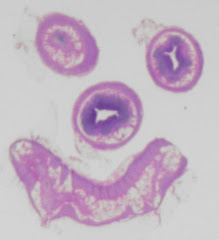I keep having to remind myself that there may be some poor souls reading this who haven't a clue what a PA is; what they do; and what they mean in the 'grand scheme' of the monstrous machine that is our healthcare system. So here goes with some more ramblings, some of which may help the uninitiated to understand where PAs fit in.
I was talking to a fellow PA today concerning a seemingly small but oh so important fact about PAs. Once you're a PA and you get some training, your new-found knowledge allows you to do things which only MDs are allowed, or are mandated, or are paid, or are licensed, or are insured, to do; namely, identify (this is going to sound stupid to those not acquainted with the field) normal tissues. Please allow me to explain; I'll try to not insult the PAs out there and I'll try to not be overly simplistic. If you think of it for a second, how is one to know what normal looks like if you don't know what abnormal is? I've seen this tons of times through the years with wet-behind-the-ears Pathology Residents who unknowingly embarass themselves when, at rounds, they proudly point out a particular 'lesion' in an organ which is, in fact, completely normal. Conversely, something which is grossly abnormal can be glossed over as being unremarkable if that's the only thing that this newby has ever seen. I'm probably not getting this across with as much accuracy as I'd like but suffice it to say that the simple act of confidently identifying even normal, let alone lesional, tissue is a feat reserved for an elite group of individuals and although PAs take this ability for granted, it is something that only they, and medical doctors can, with confidence, do. You'll not be very surprised that my next thought is that PAs don't get paid anywhere near what they're worth. You'll likely say, yah sure, everyone says that and I admit that I am biased (how'd you guess?) but I assure you that it definitely applies in this case. Don't take my assurance though, take the word of various surgeons and oncologists who know that their patients are best served when their specimens are handled by PAs and no one else (I think I'm beginning to repeat myself! Sorry).
I was spouting to a colleague earlier today (a different individual than the fellow PA mentioned above) that PAs, somewhat like Cytotechs should have a feature built-in to their registration or license (when that occurs) which prescribes a limit to the number of complex surgical specimens which can be examined in a day (In Ontario, Cytotechnologists have a 60 slide/day limit). If one realizes that the profession of PA is akin to an art rather than a pigeon-holed assembly line type of occupation doing the same thing hour after hour and day after day, the idea of placing a limit on the number of examined specimens, in order to ensure that the last one is examined with the same level of expertise, application of knowledge and use of judgement as the first, is indeed a very good idea in my opinion -- for the patient's sake. I was also saying to this colleague that PAs will do well to continue to diversify their interests in the service of the Pathologists, if not insist upon it. That is to say that they should include things like brain-cutting, sectioning and reporting (incl. opportunities for learning with the Neuropathologist) as well as heart sectioning and reporting (incl. similar teaching opportunities with the Cardiovascular Pathologist). Just like Pathologists who have a portion of their work week allocated for CME activities or other academic pursuits, so should PAs. It is in the interests of not just the patients or the institutions to have well-trained PAs. It is in the interests of the Pathologists to have interested, well-informed, well-rounded, alert PAs acting on their behalf. It is the Pathologist's signature that goes at the bottom of the report but they had better be confident that the PAs who are working for (or with, if you prefer) them are doing the job at least as well as they could do themselves. That level of trust MUST be present in the relationship between PA and Pathologist. If not, the PA need not exist. I'd hate to be a Pathologist who couldn't trust the PA. I would like to think (and I'm not kidding myself) that there isn't one of the twenty-seven Pathologists at The Ottawa Hospital who wouldn't honestly admit that the 9 PAs are doing at least as good a job as they could do themselves. I know that they would say, if asked, that the PAs are the greatest. Regrettably, words don't buy that Mercedes I've had my eye on!
Thursday, February 03, 2005
Subscribe to:
Post Comments (Atom)



No comments:
Post a Comment